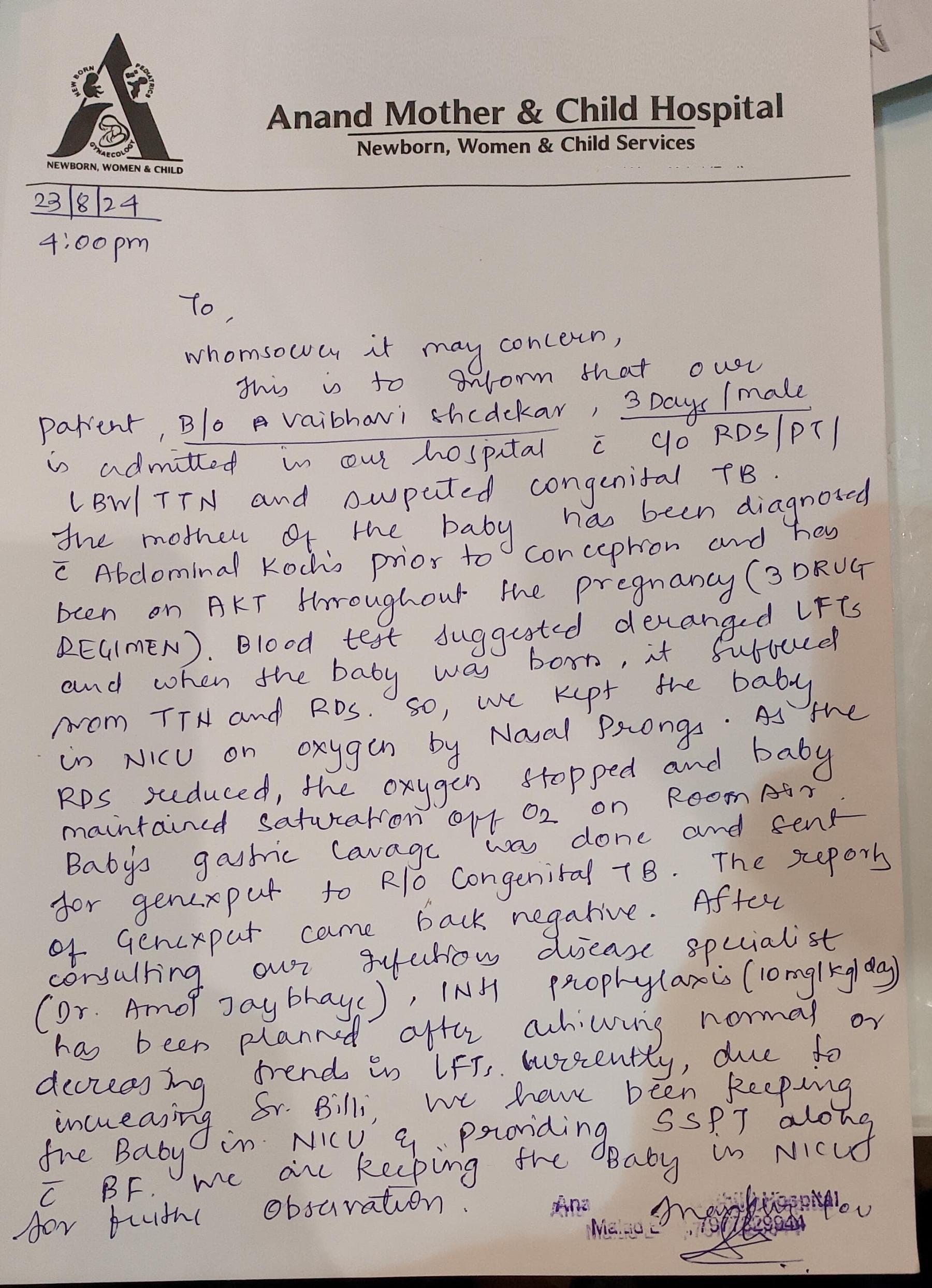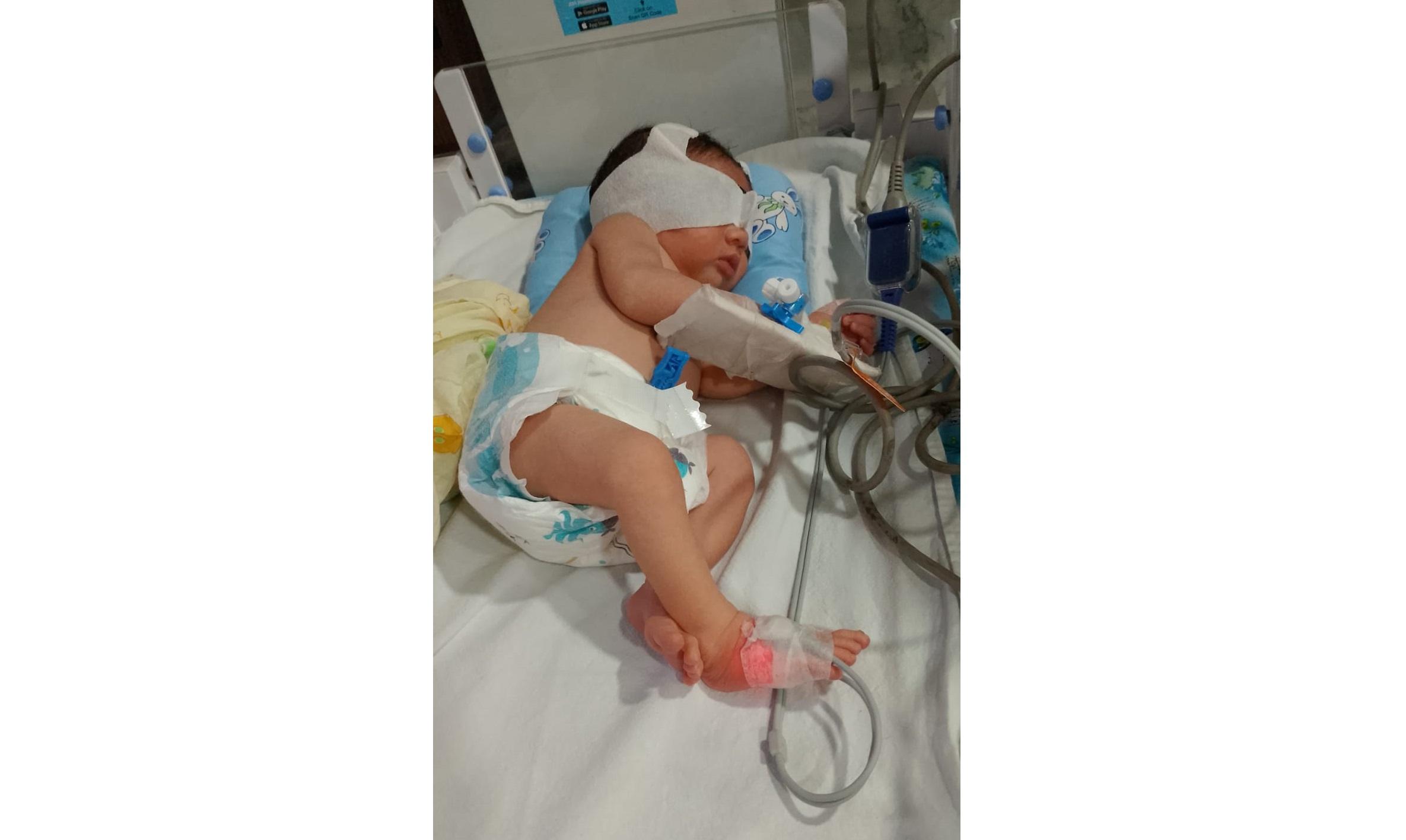A 3-day-old male child, was born preterm with low birth weight and experienced respiratory distress at birth. His mother has a history of abdominal Koch's disease and was on anti-tuberculosis treatment (ATT) throughout her pregnancy, taking a 3-drug regimen. Given the mother’s medical history, the baby was tested for congenital TB soon after birth. The baby presented with symptoms of Transient Tachypnea of the Newborn (TTN) and Respiratory Distress Syndrome (RDS), requiring immediate admission to the Neonatal Intensive Care Unit (NICU) where he was placed on oxygen via nasal prongs.
Clinical Presentation:
- Respiratory Distress: The baby had severe RDS and TTN at birth, which required oxygen therapy in the NICU. As the baby's respiratory condition improved, oxygen support was gradually reduced, and he was able to maintain normal oxygen saturation in room air.
- Suspected Congenital Tuberculosis: Due to the mother’s TB diagnosis and ongoing treatment during pregnancy, the baby was considered at risk for congenital TB. A gastric lavage was performed and sent for GeneXpert testing, which returned negative. Despite the negative result, INH prophylaxis has been planned after the normalization of liver function trends.
- Liver Function Tests (LFTs): Blood tests indicated deranged liver function, and the baby is being monitored for improving trends in LFTs. Due to the elevated serum bilirubin levels, the baby is undergoing treatment for jaundice.
- NICU Stay: The baby remains in the NICU for close monitoring and specialized care, including Supplemental Sensory Protective Therapy (SSPT) and breastfeeding (BF).
Treatment Plan:
- NICU Support: Continuous monitoring and care in the NICU, including oxygen therapy, now discontinued as the baby's condition improves.
- Management of RDS and TTN: The baby is being monitored for respiratory recovery after showing signs of improvement and no longer requiring oxygen.
- INH Prophylaxis: Although the GeneXpert test for congenital TB returned negative, the baby will receive INH prophylaxis following improvement in liver function.
- Management of Hyperbilirubinemia: Ongoing treatment to reduce elevated bilirubin levels and stabilize the baby’s liver function.
- Prolonged NICU Stay: The baby will require a longer stay in the NICU for further monitoring, medication, and supportive therapy.
The estimated cost of the treatment is approximately ₹500,000, covering all expenses from admission to discharge, including investigative tests (pre and post-treatment), doctor charges, medications, oxygen therapy, and other NICU services.
The baby's father is a daily wage laborer, earning a minimal income that is insufficient to cover the high cost of this specialized treatment. The family is facing significant financial hardship and cannot afford the necessary medical care for their newborn.
Due to the severity of the baby’s condition and the financial constraints faced by the family, we urgently request financial assistance to cover the cost of treatment. This support will be crucial in ensuring that the baby receives the necessary medical care for recovery.
We sincerely hope for your generous support in this time of need. Your contribution will make a life-saving difference for this family.
All donations made to Saaya Foundation are exempt under section 80G of the Income Tax Act. Registered ID: U85300MH2022NPL383369
Saaya Foundation, a National Registered Charity is raising funds for Bay of Vaibhavi.
Saaya Foundation works in the areas of Medical Support, Women Empowerment, Child Rights, Social Awareness Programs, Protection from Domestic Violence, Health Initiatives, Personality Development Programs, Education, Natural Calamity Relief and other impact driven programs.



Comments